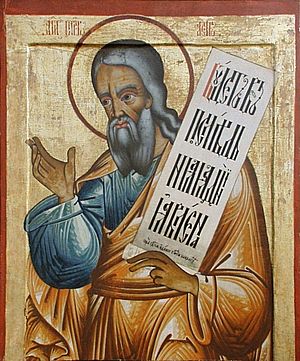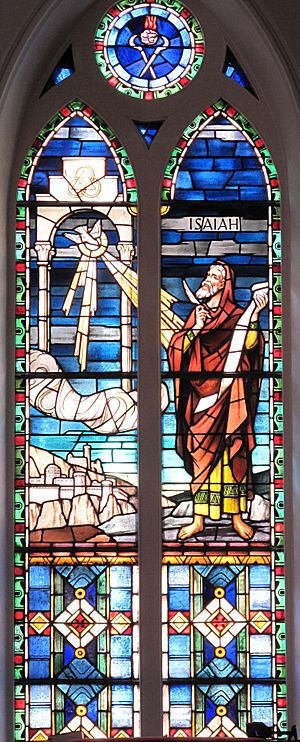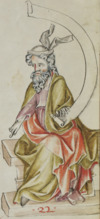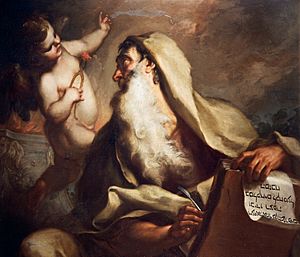Isaiah facts for kids
Quick facts for kids Isaiah |
|
|---|---|

Fresco from the Sistine Chapel ceiling by Michelangelo
|
|
| Prophet | |
| Born | 8th century BC |
| Died | 7th century BC |
| Venerated in | Judaism Christianity Islam |
| Feast | May 9 Thursday after the Feast of the Transfiguration (Armenian Apostolic Church) |
| Major works | Book of Isaiah |
Isaiah (UK: /aɪˈzaɪ.ə/ or US: /aɪˈzeɪ.ə/; Hebrew: יְשַׁעְיָהוּ, Yəšaʿyāhū, meaning "Yahweh is salvation") was an important prophet in ancient Israel. He lived in the 8th century BC. The Book of Isaiah in the Bible is named after him.
Many people believe that Isaiah wrote all 66 chapters of the book. He might have written it in two main periods, between 740 BC and about 686 BC. Other scholars think that only the first part of the book (chapters 1–39) was written by Isaiah himself. They believe other parts were added later by different writers or groups of prophets. These later parts might have been written almost 200 years after Isaiah lived.
Contents
Isaiah's Life and Times

The Book of Isaiah tells us that Isaiah was a prophet during the reigns of four kings of Judah: Uzziah, Jotham, Ahaz, and Hezekiah. King Uzziah ruled for 52 years in the middle of the 8th century BC. Isaiah likely began his work as a prophet a few years before Uzziah died, around the 740s BC. He may have continued to prophesy for as long as 64 years.
Some interpretations suggest that Isaiah's wife was also called "the prophetess." This could mean she had a gift for prophecy, like other women in the Bible. Or it might simply mean she was the wife of a prophet. They had two sons. The older son was named Shear-Jashub, which means "A remnant shall return." Their younger son was named Maher-Shalal-Hash-Baz, meaning "Quickly to spoils, plunder speedily."
During Isaiah's time, the powerful Assyrian Empire was a big threat. The Assyrian king Shalmaneser V conquered the northern Kingdom of Israel. He destroyed Samaria and took many people captive. While King Ahaz ruled Judah, the Assyrians did not attack Judah directly.
However, when King Hezekiah became king, he decided to rebel against Assyria. He made an alliance with the king of Egypt. This made the Assyrian king, Sennacherib, very angry. Sennacherib brought his large army into Judah. King Hezekiah was very worried and at first, he gave in to the Assyrians.
But soon, war broke out again. Sennacherib led his army back into Judah, and a part of his army threatened Jerusalem. Isaiah encouraged King Hezekiah to stand strong against the Assyrians. Sennacherib then sent a threatening letter to Hezekiah. Hezekiah took the letter and "spread it before the LORD" (God).
Then Isaiah son of Amoz sent this message to Hezekiah: "Thus said GOD, the God of Israel, to whom you have prayed, concerning King Sennacherib of Assyria—
this is the word that GOD has spoken concerning him:
Fair Maiden Zion despises you,
She mocks at you;
Fair Jerusalem shakes
Her head at you.
Whom have you blasphemed and reviled?
Against whom made loud your voice
And haughtily raised your eyes?
Against the Holy One of Israel!
The Bible says that an angel of God caused 185,000 Assyrian soldiers to die in one night. This event shocked Sennacherib. He never fully recovered from this defeat in Judah. He did not launch any more major attacks against Judah or Egypt.
The rest of King Hezekiah's reign was peaceful. Isaiah likely lived until the end of Hezekiah's rule. He may have even lived into the reign of King Manasseh. The Bible does not say how or when Isaiah died. However, some ancient Jewish writings say that he was put to death by being sawn in two under King Manasseh's orders.
The Book of Isaiah, like the Book of Jeremiah, often talks about God's strong feelings against wrongdoing. For example, Isaiah 9:19 says, "Through the wrath of the LORD of hosts is the land darkened, and the people shall be as the fuel of the fire."
Isaiah in Different Religions
Christian Beliefs About Isaiah
Some early Christian writings, like the Ascension of Isaiah, tell a detailed story of Isaiah facing a false prophet and being martyred. However, these stories are not found in the original Bible.
Many Christian leaders praised Isaiah. Gregory of Nyssa (who lived around 335–395 AD) believed Isaiah understood the Christian message better than anyone else. Jerome (around 342–420 AD) said Isaiah was more like someone telling a past story than predicting the future. This is because he described the events of Jesus' life so clearly. Christians believe that parts of Isaiah's book, especially the "Suffering Servant" songs, directly predict the life and death of Jesus Christ.
The Book of Isaiah is quoted many times in the New Testament. The Gospel of John says that Isaiah "saw Jesus' glory and spoke about him."
The Eastern Orthodox Church and the Roman Catholic Church honor Saint Isaiah the Prophet on May 9th.
Members of the Church of Jesus Christ of Latter-day Saints also value Isaiah's words. They believe that many of his prophecies have been or will be fulfilled. For example, they see the founding of their church and the translation of the Book of Mormon as fulfillments of Isaiah's prophecies. They also believe that building their temples fulfills prophecies in Isaiah.
Isaiah in Islamic Traditions
Isaiah (Arabic: إِشَعْيَاء, romanized: Ishaʿyāʾ) is not directly named in the Quran or Hadith. However, he is often mentioned as a prophet in other Muslim writings. These include stories of the prophets and commentaries on the Quran.
Muslim scholars like Al-Tabari describe Isaiah's life. They say he was a prophet in Judah during the reign of King Hezekiah. Hezekiah listened to Isaiah's advice. However, the people of Israel continued to have problems. After Hezekiah died, Isaiah warned the people not to abandon God. He told them to stop their sins and disobedience.
Islamic tradition also states that the unrighteous people of Judah tried to kill Isaiah. Like some Jewish traditions, Muslim writings say that Isaiah was martyred by being sawn in two by the Israelites.
Some Muslim scholars believe Isaiah prophesied the coming of both Jesus and Muhammad. For example, a scholar named Ali al-Ridha used a passage from the Book of Isaiah to argue that both Jesus and Muhammad were prophets. He described a vision of two riders, one on a donkey and one on a camel. He explained that the rider on the donkey was Jesus, and the rider on the camel was Muhammad.
Isaiah in Jewish Rabbinic Writings
Jewish rabbinic literature adds many details and stories about Isaiah that are not in the Bible.
- His Family and Calling: According to ancient rabbis, Isaiah was a descendant of Judah. His father, Amoz, was said to be the brother of King Amaziah. The Midrash (a collection of Jewish teachings) says that Isaiah heard God asking, "Whom shall I send?" Isaiah replied, "Here am I; send me!" God warned him that his mission would be difficult. He said the people might insult or even beat him. But Isaiah accepted the challenge. He was known for being very patient and patriotic, always defending Israel and asking God for forgiveness for their sins.
- His Death: The Talmud (another collection of Jewish teachings) tells a story about Isaiah's death. It says that King Manasseh killed Isaiah. The story says that Isaiah hid inside a cedar tree to escape King Manasseh. However, the fringes of his clothing gave him away. King Manasseh then ordered the tree to be sawn in half. The legend says that when the saw reached Isaiah's mouth, he died. This was seen by some as a punishment for a comment he made about the people having "unclean lips." This story of Isaiah's martyrdom spread to other cultures as well.
Archaeological Discoveries
In February 2018, archaeologist Eilat Mazar announced an exciting discovery. Her team found a small clay seal impression, called a bulla, during excavations in Ophel, near the Temple Mount in Jerusalem. The seal reads "[belonging] to Isaiah nvy." This could mean "[belonging] to Isaiah the prophet."
This tiny seal was found very close to another bulla discovered in 2015. That one clearly read "[belonging] to King Hezekiah of Judah." While the name "Isaiah" on the new seal is clear, some damage on the seal makes it hard to be absolutely sure if the word "nvy" means "prophet" or is part of another name. This means there's still some discussion about whether this seal truly belonged to the prophet Isaiah.
See also
 In Spanish: Isaías (profeta) para niños
In Spanish: Isaías (profeta) para niños
 | Sharif Bey |
 | Hale Woodruff |
 | Richmond Barthé |
 | Purvis Young |




